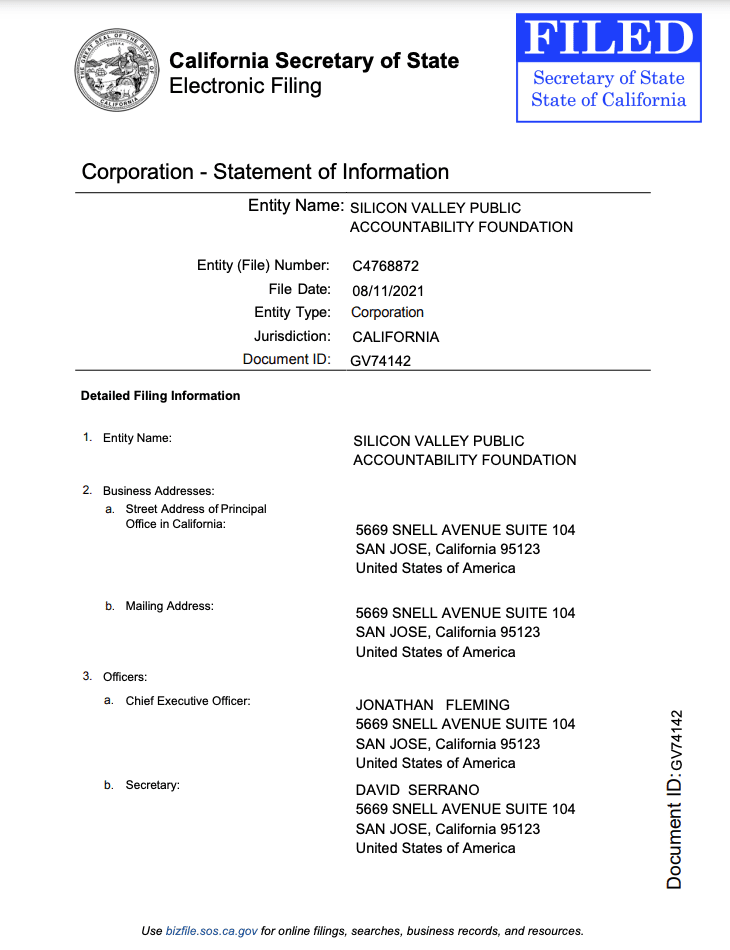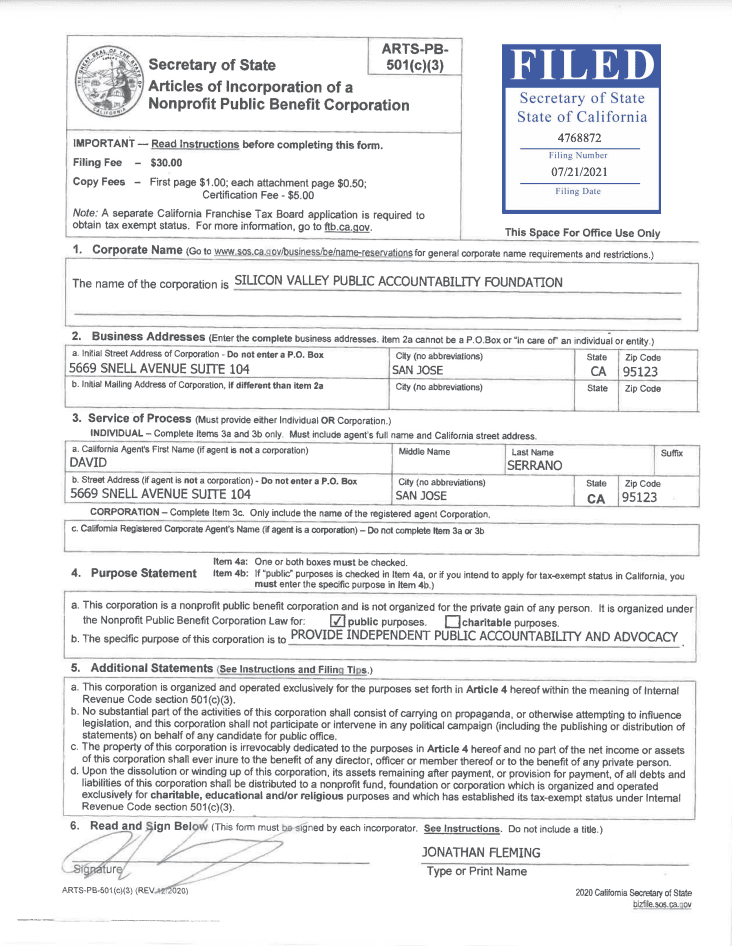A new local advocacy group is rallying against San Jose’s policies on gun control and homelessness, but the organization doesn’t want the public to know who is behind it—or who is funding it.
The political nonprofit, called Silicon Valley Public Accountability Foundation, promotes a stance against gun control and the “housing first” approach to solve homelessness—all while soliciting donations. But the group’s website says nothing about who launched the group, who runs it or serves on its board.
Documents filed with the California Secretary of State show the organization has local roots, San José Spotlight found.
Former San Jose council candidate Jonathan Fleming, a mechanical engineer who unsuccessfully ran for council twice, quietly started the advocacy nonprofit in July, documents show. The organization touts policies similar to Fleming’s 2020 campaign, but campaign finance experts are raising eyebrows about its potential to funnel dark money in the upcoming election in June.
The advocacy group is registered under an address in Bloom Plaza on Snell Avenue. An older version of the website listed a phone number that Fleming used during his 2020 election campaign. The number is no longer on the website, but a voicemail greeting confirmed its association to the group.


Although state filings classify the group as a 501(c)(3), the organization refers to itself multiple times as a 501(c)(4) with pending status on its website—including when soliciting donations. The Franchise Tax Board also lists the organization as not-exempt, which is unusual for 501(c)(3) organizations.
The state does not have actual filings for 501 (c)(4) organizations so the group appeared to have used the appropriate forms.
Fleming, a Republican who ran on a platform of fiscal responsibility, pro-police and anti-tax, serves as the CEO of the group, according to state filings. He did not respond to phone calls about his group in November. He explained in March that he did not respond because of a medical emergency.


Concerns about dark money
Silicon Valley Public Accountability Foundation describes itself as a public watchdog and advocate for the South Bay and solicits donations on its website. It’s unclear how active the group has been in lobbying for the causes it champions on its website.
The creation of Silicon Valley Public Accountability Foundation, just a year ahead of a consequential local election, also raises questions for experts about potential dark money in local politics. As a 501(c)(4), a social welfare nonprofit, the think-tank could accept unlimited donations and spend up to half of that money in political campaigns.
California campaign laws require all corporations, including advocacy nonprofits, to report spending on political activities through finance campaign reports. But these groups often find a way to hide the money if they claim it was not political spending.
Campaign finance laws often lack teeth to regulate these activities, some experts say.
“I wouldn’t call it a red flag, but (it) should be enough to raise questions,” Ann Ravel, former chair of the Federal Election Commission and the California Fair Political Practices Commission, told San José Spotlight. “Transparency to the public is really meaningful, because when the public’s in the dark about these things, they begin to lack trust in government.”
Fleming’s new group isn’t the only one clouding the election season.
San Jose Mayor Sam Liccardo launched a 501(c)(4) group called Solutions San Jose earlier this year. The organization has lobbied on numerous city issues, including homelessness and affordable housing, featuring multiple local and state officials.
Advocacy nonprofits have long allowed special interests and wealthy donors to sway elections, Ravel said.
“There’s no question that this issue relating to 501(c)(4)s and others has arisen in the state and has impacts on elections,” she said, adding that she’s seen these groups doling out big bucks for political campaigns as early as 2012. “Whether it’s new in the county or in San Jose, I can’t tell—but it is definitely a major issue.”
These groups can buy political ads, run phone banks and make contributions to super PACs—with almost no strings attached. That makes them the primary source of dark money in politics, said Pete Quist, deputy research director of OpenSecrets, a group that tracks campaign finance and lobbying.
“501(c)(4)s can be anything, anyone could set one up,” Quist told San José Spotlight. “And they can be named anything… so it’s very difficult to see what the script really is.”
It’s unclear whether the Silicon Valley Public Accountability Foundation’s secretary David Serrano and chief finance officer Sonia Chang have any political ties in the South Bay.
Dormant lobbying efforts
The group’s website advocates against gun control, permanent supportive housing and an initiative to build denser called Opportunity Housing.
It argues that some of the initiatives proposed by local lawmakers in the wake of a mass shooting at a VTA rail yard, such as mandating all purchases at gun shops be video and audio recorded and requiring gun owners to carry insurance and pay an annual fee, are unconstitutional and won’t prevent gun violence.
The group also rejects the “housing first” approach to solving homelessness adopted by the city and county, and instead calls for more focus on rehabilitation and treatment for mental illness. It also pushes for a “university-like campus” to house homeless people away from schools and neighborhoods and offer on-site services—the exact language Fleming used in his 2020 campaign.
The website has no information on its stance on Opportunity Housing beyond calling for the preservation of single-family zoning.
Unlike the mayor’s Solutions San Jose, the group has hosted no events, run no ads or even made itself known on social media five months after its creation.
The group isn’t active on Facebook and has only tweeted once.
“We are a think-tank foundation comprised of local community members, neighborhoods, businesses, and more,” the sole tweet in August reads. “We bring together residents, leaders, and experts to empower them with the resources required to hold local governments accountable & evoke positive change in our community.”
A community member responded, “Who is your board? Who funded the initial creation of the organization?”
The group offered no answer.
Contact Tran Nguyen at [email protected] or follow @nguyenntrann on Twitter.



Leave a Reply
You must be logged in to post a comment.